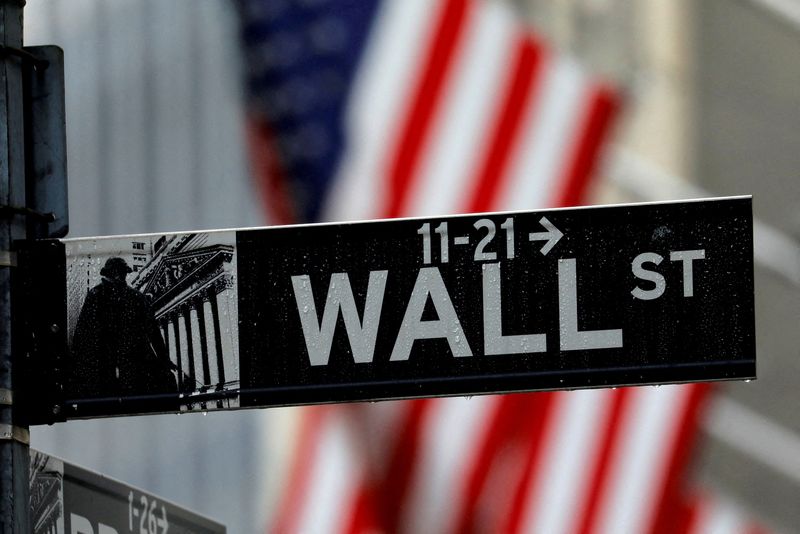(Bloomberg) -- A sober warning for Wall Street and beyond: The Federal Reserve is still on a collision course with financial markets.
Stocks and bonds are set to tumble anew even though inflation has likely peaked, according to the latest MLIV Pulse survey, as rate hikes reawaken the great 2022 selloff. Ahead of the Jackson Hole symposium later this week, 68% of respondents see the most destabilizing era of price pressures in decades eroding corporate margins and sending equities lower.
A majority of the more than 900 contributors, who include strategists and day traders, reckon inflation has topped out. Still, a whopping 84% say it may take two years or longer for the Jerome Powell-led central bank to bring it down to the official long-term target of 2%. In the meantime, American consumers will cut spending, and unemployment will climb over 4%.
All these bearish sentiments underscore the deep skepticism held by investors in the face of an unexpected $7 trillion equity rebound of late. While stocks fell last week, S&P 500 has still trimmed its 2022 loss to 13% versus the 23% decline through its mid-June nadir.
“This is a bear-market trap,” Victoria Greene, founding partner at G Squared Private Wealth, said in an interview. “Inflation is the big, bad boogie man. Even if there really is a sustained decrease in inflation, it could take a while before prices actually come down significantly.”
The survey results spell trouble for dip buyers, who recently re-emerged after the horrendous first half — driven by bets on a less-hawkish monetary tightening cycle while a slew of quant funds have shifted to a bullish positioning. In turn, shares around the world have clawed back some of the worst losses while the 10-year Treasury yield has fallen back to around 3% from the peak near 3.5% earlier this year.
US equities saw their worst rout in two months Monday, following the surge that drove the S&P 500 to its best start to a third quarter since 1932.MLIV respondents, for their part, reckon bond prices are set to dip again over the next month, with Fed Chair Powell having an opportunity to renew hawkish market expectations at the gathering this week in Jackson Hole, Wyoming.
Fed funds futures showed traders are betting the central bank will stop hiking after raising the benchmark to 3.7% and will start cutting as early as May 2023. Yet even the doves are pushing back, with Minneapolis Fed President Neel Kashkari recommending a 4.4% rate by the end of next year.
It’s hard to overstate why all this matters. A fast pace of monetary tightening, and the resulting economic fallout, is the biggest risk for money managers all over the world, with interest rates a key driver of corporate valuations. The bad news, per survey participants, is that inflation will deliver a meaningful blow to margins, pushing stocks lower.
While inflation’s effect on profit margins is very much an open question, the majority of MLIV readers appear closer to the bearish spectrum of a heated Wall Street debate on where stocks are headed. As elevated prices persist, consumers are likely to buy less during the next six months, a majority of respondents say.
That’s in line with warnings from the world’s largest retailer, Walmart (NYSE:WMT) Inc., that soaring inflation is forcing shoppers to pay more for essentials at the expense of other discretionary items. A cutback in consumer spending would impose a clear drag on profits posted by S&P 500 companies, which are also grappling with higher wages, rising inventories and continued supply-chain problems in China.
While the S&P 500’s margins peaked a year ago, the trough may not come until the fourth quarter, according to Bloomberg Intelligence. Consensus estimates for net-income margins have fallen about a half percentage point for both the third and fourth quarters since the start of this earnings season, with communication services, health care and consumer sectors among the weakest groups, BI data show.
Pulse contributors also reckon unemployment is likely to rise above 4% but not higher than 6% -- a worrisome level that's higher than what policy makers are anticipating but lower than in previous severe economic downturns. That offers some comfort that any recession would be short lived, providing a dip-buying opportunity for risk assets.
“It’s rare for the Fed to aggressively tighten policy without causing market volatility,” said John Cunnison, chief investment officer at Baker Boyer Bank. “Stocks aren’t wildly cheap right now, but they're not as expensive as they were six months ago, especially growth companies.”
(Updates S&P 500 returns, adds Monday stock move)
©2022 Bloomberg L.P.
